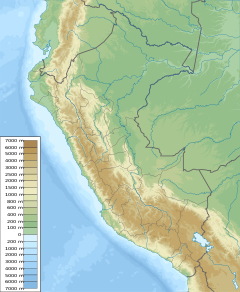Otishi National Park
| Otishi National Park | ||
|---|---|---|
|
|
||
| Location: | Junín , Cusco , Peru | |
| Surface: | 2925.76 km² | |
| Founding: | January 13, 2003 | |
The Otishi National Park (Spanish: Parque Nacional Otishi ) is a national park founded on January 13, 2003 in Peru , which was approved by Decree Nº 003-2003-AG.
location
The 2925.76 square kilometer park extends over the higher elevations of the Cordillera de Vilcabamba . The area stretches from the Río Tambo district in the Satipo province in the Junín region to the Echarate district in the La Convención province in the Cusco region .
The park is located in an area between the southern latitudes 11/10/0 / S to 12/20/0 / S and the western longitudes 72/50/0 / W to 73/35/0 / W.
There is only one road into the park as far as Puerto Ocopa ( 11 ° 9 ′ S , 74 ° 18 ′ W ). The park can then only be reached via the Río Ene , Río Tambo and Río Apurímac .
Another potential access to the park is the Río Urubamba .
flora
The park has four different forest zones. These are:
- Very humid tropical pre-mountain forest with an average annual rainfall of 3800 millimeters. This part is dominated by climax vegetation .
- Tropical pre-mountain rainforest with an annual rainfall of more than 4000 millimeters. The vegetation varies from small to medium-sized plants to thin slender trees.
- Lower tropical and subtropical mountain rainforest with an annual rainfall of up to 4500 millimeters with small to medium-sized trees and typical Puna vegetation
- Tropical and subtropical mountain rainforest the average amount of rain varies between 2000 and 4000 millimeters. The vegetation is dominated by trees up to 15 meters high.
A survey revealed three different types of vegetation. First of all, one of the sour grass family , Xyris sp., Eriocaulon , Bartsia , valerian , ragweeds and shrubs such as daisy family , heather family and gentian family should be mentioned. In between there are trees of the genus Weinmannia , Symplocos and Bergaralien . Another area of the park is dominated by Polylepis . In a third vegetation zone you can find Symplocos , Gynoxys and Myrsine .
fauna
Mammals
123 species of bats have been counted in the park . At altitudes around 3300, the fauna is dominated by 10 different species of rodents. So you can find wild real guinea pigs ( cavy ) here. The spectacled bear ( Tremarctos ornatus ) is also native at this altitude . In 1997, a species new to science called Cuscomys ashaninka , a member of the chinchilla rat family, was discovered in the area. Another rodent that is found in the area is the domestic shrew pouch rat ( Monodelphis domestica ). Up to 1000 meters you can find pakas , red deer , whitebeard peccaries , collared peccaries and a few large ape species among the mammals .
Birds
412 species of birds have been counted in the park. Among them are u. a. the gray- crowned snapper tyrant ( Myiophobus pulcher ), the rust-throated thistle-tail ( Schizoeaca vilcabambae ), the marcapata tree slip ( Cranioleuca marcapatae ), the white-spotted ant pitta ( Grallaria erythroleuca ) and the Parodi-Hemispingus ( Parodi ) hemisping .
Amphibians and reptiles
In 2003, the species Proctoporus sucullucu, which is a new species for science and belongs to the family of dwarf teas, and two new frog species of the genus Phrynopus (including Phrynopus ayacucho ) were discovered in the park .
literature
- Louise Hickok Emmons: A new genus and species of abrocomid rodent from Peru (Rodentia, Abrocomidae) . In: American Museum novitates . No. 5 , p. 1–14 ( online [PDF; accessed September 4, 2011]).
Web links
- Conservation International - Otishi National Park: Rallying Communities for Conservation
- World Database on Protected Areas - Otishi National Park (English)
- Instituto del bien Común (IBC) - Parque Nacional Otishi (span .; PDF; 507 kB)
- Enjoy Peru - Parque Nacional Otishi (span.)
Individual evidence
- ↑ Enjoy Peru - Parque Nacional Otishi ( Memento of the original from March 21, 2012 in the Internet Archive ) Info: The archive link was inserted automatically and has not yet been checked. Please check the original and archive link according to the instructions and then remove this notice. (span.)
- ↑ a b c Instituto del bien Común, p. 5
- ↑ Instituto del bien Común, p. 7
- ↑ a b Instituto del bien Común, p. 12
- ↑ a b c Instituto del bien Común, p. 13
- ↑ Louise Hickok Emmons
- ↑ Instituto del bien Común, p. 15
- ↑ a b Instituto del bien Común, p. 16
